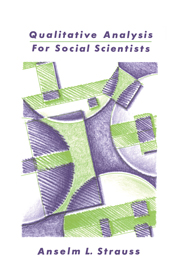Book contents
- Frontmatter
- Contents
- Preface
- 1 Introduction
- 2 Two illustrations
- 3 Codes and coding
- 4 Seminar on open coding
- 5 Memos and memo writing
- 6 Team meetings and graphic representations as memos
- 7 Excerpts that illustrate common problems
- 8 Integrative diagrams and integrative sessions
- 9 Integrative mechanisms: diagrams, memo sequences, writing
- 10 Presenting case materials: data and interpretations
- 11 Grounded formal theory: awareness contexts
- 12 Reading and writing research publications
- 13 Questions and answers
- 14 Research consultations and teaching: guidelines, strategies, and style
- Epilogue
- Appendix Discovering new theory from previous theory
- References
- Author index
- Subject index
4 - Seminar on open coding
Published online by Cambridge University Press: 26 January 2010
- Frontmatter
- Contents
- Preface
- 1 Introduction
- 2 Two illustrations
- 3 Codes and coding
- 4 Seminar on open coding
- 5 Memos and memo writing
- 6 Team meetings and graphic representations as memos
- 7 Excerpts that illustrate common problems
- 8 Integrative diagrams and integrative sessions
- 9 Integrative mechanisms: diagrams, memo sequences, writing
- 10 Presenting case materials: data and interpretations
- 11 Grounded formal theory: awareness contexts
- 12 Reading and writing research publications
- 13 Questions and answers
- 14 Research consultations and teaching: guidelines, strategies, and style
- Epilogue
- Appendix Discovering new theory from previous theory
- References
- Author index
- Subject index
Summary
This chapter is not a discussion of research procedures as such, but is an extended illustration of open coding, with commentaries on particular instances of it. Again, readers who are eager to move directly to procedures should defer reading this chapter until later, although it is placed here because to most readers it should be useful to at least scan it, especially the analytic commentary in its closing pages.
The chapter consists of one case: a research seminar session which was recorded on tape. The format of the presentation is this: first, a short introduction to the case; second, the analytic discussion itself; third, an analytic summary, with a detailed commentary on each phase of that unfolding discussion.
In the long extended case, the seminar participants are seen working together on the very real data of a researcher–student. By contrast, the pain-theory case in Chapter 2 illustrated a very active teacher, at a very early session of the seminar, “getting across” various elements of grounded theory methodology, using not a presenting student's data but only the combined experiential data of himself and the class participants. Here, while experiential data come visibly into play as an element of the analysis, the chief data are not collective data. Besides, there is the additional, if invisible, drama of a presenting student who is deeply concerned about the outcome – the product – of the class discussion.
Of course, the materials in this chapter are designed not only to illustrate the teaching–learning of analysis within the seminar setting, but to clarify further how qualitative analysis, especially open coding, is carried out in the grounded theory style of analysis.
- Type
- Chapter
- Information
- Qualitative Analysis for Social Scientists , pp. 82 - 108Publisher: Cambridge University PressPrint publication year: 1987
- 1
- Cited by



